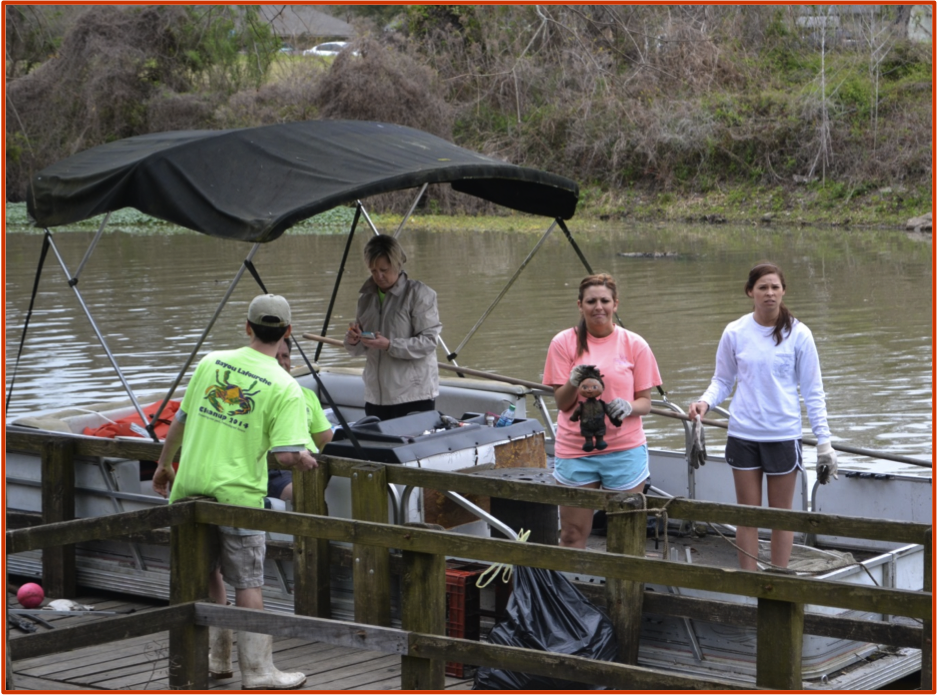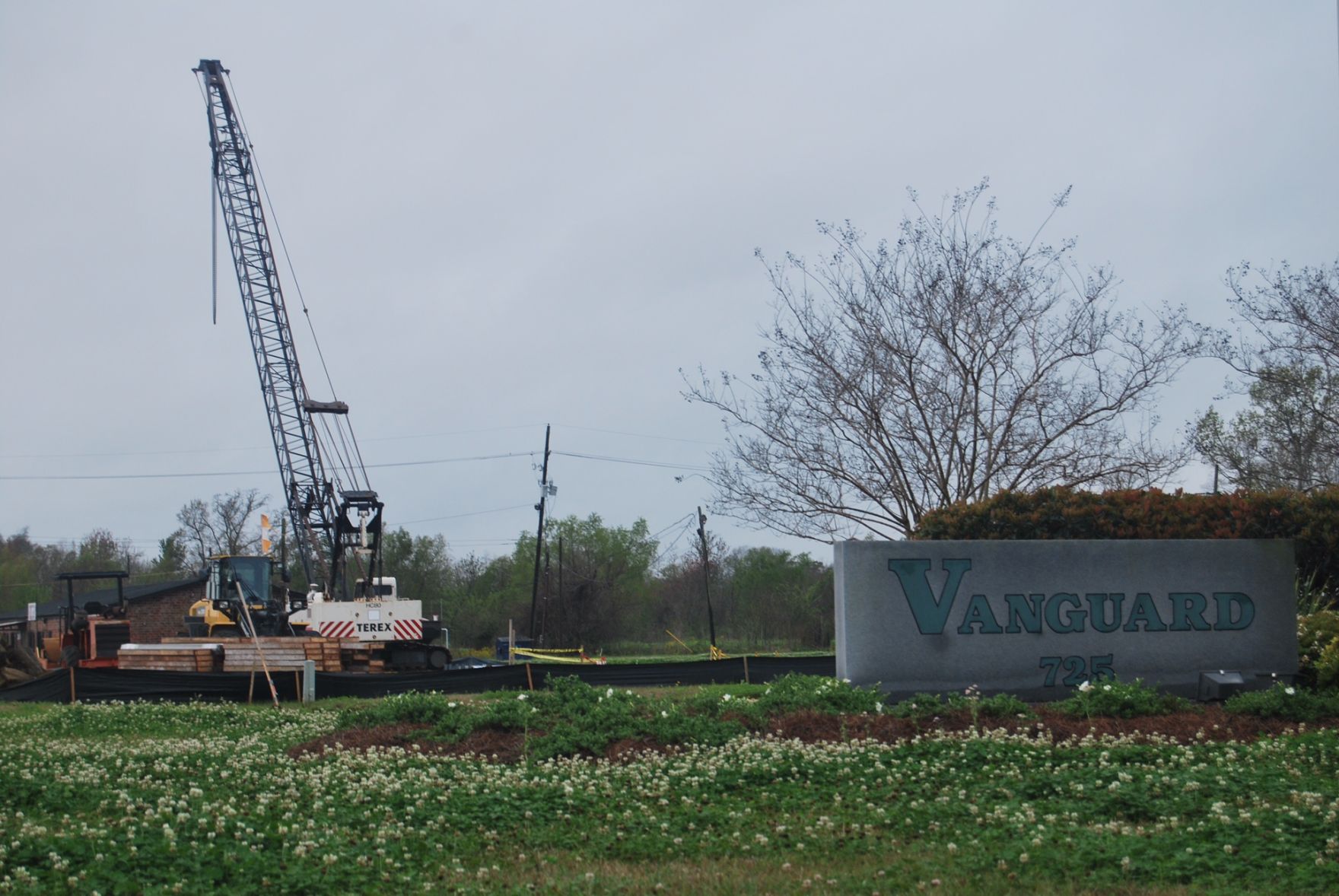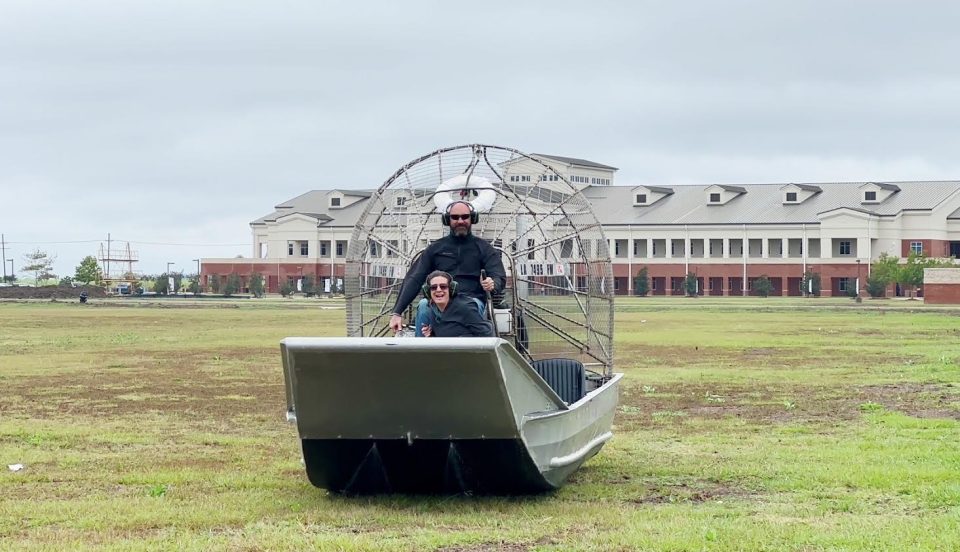
Fourth annual Bayou Lafourche Cleanup set for Saturday
March 12, 2015
Xavier Keion Richard
March 19, 2015As a contentious Terrebonne Parish injection well near homes and businesses moves closer to going online, opponents are gearing up for what could be the final showdown in a three year long battle against it.
The Terrebonne Parish government, which had dropped its own fight against the well, must now decide whether to pick it up again.
Aside from concerns over contamination of drinking water, opponents worry about carcinogenic air pollutants being released so close to a school, church, homes and parks.
Some nearby residents are fearful of health risks posed by the operation of the well, which is located at New Orleans Boulevard just south of North Hollywood Road.
“I really wish they wouldn’t do it,” said Allen Dumond, who owns a home near the well and works offshore. “…There are contaminants they’re pulling off of the waste oil tanks [that] are more than just gray water going through the system…They’ll be pumping no telling what [into that well.”
Brandon Gawlik, owner of Vanguard Environmental, contends that there is no danger posed to the community by his company’s injection well.
“I’ve got five little kids and a pregnant wife that are at that office every day,” Gawlik said. “So if I was doing something so bad, then why would I have them there?”
Saltwater injection wells exist throughout the state. There are over 20 of them in the Houma area. The difference with this well is that it is a commercial well that will be pumping waste water under northern Houma from oil producers throughout the region in an area that is surrounded by homes, a school, a church, a playground, and businesses.
Parish law would have prevented the well from ever being drilled had not state law, which is more lenient, superseded it.
The Terrebonne Parish Council is set to decide later this month whether to join in court action being undertaken by two environmental groups, seeking to have the Louisiana Department of Environmental Quality reexamine a decision the agency made.
The Vanguard well was given an automatic exemption from being required to get an air pollution permit.
We Can Guard Houma and the Louisiana Environmental Action Network are two groups that went to court challenging the process by which the Louisiana Department of Environmental Quality granted an air emissions permit exemption to Vanguard Environmental, an oil field waste-water disposal company that has drilled a saltwater injection well on their property.
This is the final round in a fight against Vanguard that has lasted more than three years.
Vanguard Environmental collects brine, or salt water, from onshore oil wells in the region. The brine, a high-chloride water-based solution, is a by-product of oil extraction. The brine contains oil and sometimes heavy metals and radioactive materials.
The brine would be pumped into Vanguard’s injection well leading into a naturally occurring underground sand formation that would absorb it like a sponge.
Oil producers who do not produce enough oil to warrant the investment of drilling their own injection wells turn to disposal companies like his, Gawlik said.
INJECTION OR WISHING WELL?
The Louisiana Department of Natural Resources gave Vanguard a permit to construct the injection well in May 2011. State law requires that a well of this type not be within 500 feet of a house, school, or church, which Vanguard’s location is not. But Terrebonne Parish has a law that bans such wells within a mile of homes and other occupied structures.
The well site is within a mile of St. Gregory Barbarigo Church and school, Glenn F. Pope Memorial Park, Williams Avenue Recreation Center and a neighborhood filled with homes.
The question was whether state law or parish law was right.
In 2012, Vanguard sued Terrebonne Parish over the ordinance and won. Terrebonne Parish appealed to the Louisiana First Circuit Court of Appeal and lost again. In November 2013, the parish took the matter to the Louisiana Supreme Court, which dismissed the case without a decision. The state law, the courts ruled, trumps the parish ordinance.
In total, the litigation cost Terrebonne Parish nearly $115,000, said Parish President Michel Claudet at last week’s council meeting.
Vanguard appeared to have a green light to move forward with the well, but there was one measure the opposition had to work with.
In order to receive an underground injection well permit from the DNR, Vanguard had to either get a permit from the Louisiana DEQ to release air pollutants, or prove they would produce less than certain thresholds of those pollutants per year.
THE AIR PERMIT
Air pollutant permits issued by the state DEQ have a built in exemption for companies that say they will pollute less than a certain amount. The agency does not verify these claims nor does it give the public any notice about companies that will soon be releasing chemicals into the air.
The DEQ considers an air permit to be a “minor permit,” said Wilma Subra, a chemist for LEAN.
“Frequently, when DEQ receives an application and reviews it, they issue the minor permit without even having any public comment or public notice and that’s how the rules are written,” said Subra, who is among people wanting that law to be changed.
An operation like Vanguard’s may produce no more than 5 tons per year of any individual pollutant and no more than 15 tons per year collectively in order to be exempt from getting an air permit, said Brian Johnston, a senior environmental scientist in the air permits division of the DEQ.
“Per the calculations that they provided at DEQ, their facility would be exempt from the need to obtain an air permit,” Johnston said.
Johnston said that the way the state legislature wrote Act 547, the law governing air emissions permitting, makes the exemption “self-implementing,” meaning that there is no classification, certificate, or status issued by the state DEQ so long as the company says the requirements are met.
In 2009, Vanguard Environmental contracted engineering firm T. Baker Smith to calculate their pollutant emissions rates to submit to the DNR. According to the report submitted to the DEQ, T. Baker Smith calculated that Vanguard Environmental’s primary pollutant would be volatile organic compounds. Those are regarded as the potentially harmful vapors released by oil and other petroleum products.
T. Baker Smith also reported that Vanguard Environmental would release a total of 3.4 tons of VOCs into the atmosphere, which is below the threshold and qualified them for an air permit exemption.
That amount, 3.4 tons of VOCs, is based on the facility processing 4,000 gallons of brine per day.
But that is significantly less brine than what Vanguard Environmental said they would process daily on their application for an injection well permit with the state DNR, said Chris Domangue, founder of We Can Guard Houma.
“So there was a major, major, tremendous discrepancy on what they told the two agencies dealing with the volume of waste they were going to be accepting at this facility,” Domangue said.
According to Domangue, Vanguard’s application to the DNR said they would process no more than 28,800 barrels of brine per day, the maximum per day allowable. Gawlik said his tanks can only handle 4,000 barrels per day.
“They bring up these numbers like 28,000 barrels — that’s just what the formation [underground] will hold,” said Gawlik. “There’s no possible way in the world I could ever bring that much water in truck-wise or ever get that much water. We don’t have that much production on land down here.”
Gawlik said that if he were to near the 5 tons threshold, he would apply for an air permit before exceeding it.
The concentration of VOCs in the brine reported by Vanguard to the DEQ is also in contention, Subra said.
Subra said that brine collected by other saltwater disposal companies in the area contains “more hydrocarbons than what they’re stating, usually, in the brine.”
Gawlik counters that he has a skimming system that collects the oil continuously in the closed tank.
Johnston said the DEQ does not verify air emission calculations submitted to the agency when considering air permit exemptions and couldn’t until a well like Vanguard’s well were operational.
“Given that Vanguard has garnered a bit of opposition, DEQ may choose to go down there after operations commence and take samples. I mean, that would just be our inspection division,” Johnston said. “But there’s not an express requirement to do that.”
CURRENT COURT ACTIONS
After the Louisiana Supreme Court dismissed Terrebonne Parish’s appeal in November 2013, attorneys for the parish requested that the DEQ investigate the discrepancies in Vanguard’s permit applications and “reopen” the process for determining Vanguard’s exemption eligibility.
The DEQ said in a letter to attorneys representing the parish dated December 9, 2014, that after reexamining the data their request for reopening was denied.
The letter also said that DEQ multiplied the amount of water Vanguard told them they would process five times and found that the site would still qualify for the exemption.
“It was that decision that we felt was ripe for taking an appeal on,” said Charles Ellis, attorney for the Lemmon Law Firm, representing the parish, at last week’s parish council meeting. “At that point, that’s when I believe we had a decision from the parish government to not move forward with it in light of [the costs of moving forward with an appeal].”
During the Feb. 11 council meeting, Lucretia McBride, a concerned citizen, brought up the fact that Terrebonne Parish was no longer pursuing any legal action to fight Vanguard Environmental’s injection well. This surprised the parish council, since they were not informed by Claudet.
Christa Duplantis-Prather, parish councilmember for district 5, the district Vanguard Environmental is in, was caught by surprise.
“This is not for just me, I mean I live here, but this is for the public, the people that were not given…the right to know what’s going on,” Prather said in a phone interview after the meeting.
Claudet apologized to the council during the Feb. 11 meeting. He said that it was during the Christmas holidays and that making executive decisions up to $50,000 fall within his powers as parish president.
Claudet said during the Feb. 11 meeting that attorneys estimated pursuing further appeals would cost $35,000 and that he believed the parish would lose, again.
Prather requested attorneys from the Lemmon Law Firm attend last week’s parish council meeting to update the public on the case.
At that meeting, Ellis said that when Claudet decided not to continue, We Can Guard Houma and the Louisiana Environmental Action Network decided to do so on behalf of the parish.
Ellis said that a petition for review of the state DEQ decision has been filed in a Baton Rouge court, and that is where the case currently stands.
THE INJECTION WELL
Vanguard’s injection well ends 4,900 feet below Houma in a sand formation that contains salt water that has more chlorides in it than the water the company plans on pumping into it, Gawlik said.
“You look at the formation that’s down there and you couldn’t have picked a better place,” Gawlik said. “The sand formation below is phenomenal.”
Typically, if properly constructed and operated and the subsurface formation is compatible, “an injection well should not represent an environmental concern,” said Steve Burnham, President of Engineering Associates, an environmental engineering consultant firm.
Burnham said that saltwater wells normally qualify for exemptions from getting an air permit because there is so little oil floating on top of the brine.
The oil must be separated from the brine before it is pumped underground, and to do so the brine sits in tanks and is pumped from the bottom, Burnham said.
But in order for the oil to be recovered, the tank must be filled and drained multiple times until the layer of oil floating on top is thick enough to be recovered, Subra said. This increases the amount of VOCs being released into the atmosphere.
THE DANGER
According to the U.S. Environmental Protection Agency, these wells prevent surface contamination of soil and water. The EPA says that there are approximately 144,000 injection wells in operation in the U.S. pumping 2 billion gallons of brine underground every day.
The state DNR says there are 71 saltwater injection wells currently operating in Terrebonne Parish.
In 2012, ProPublica.org, a non-profit investigative reporting website, examined the regulation of saltwater injection wells and reported that between “late 2007 to late 2010, one well integrity violation was issued for every six deep injection wells examined — more than 17,000 violations nationally.”
ProPublica reported that “more than 7,000 wells showed signs that their walls were leaking.”
“I don’t operate the way these people think that I operate,” Gawlik said. “…I think they’re trying to get political gain and to make a name for themselves. If it was so bad, why wouldn’t they go attack the rest of the wells in town that are in neighborhoods? Like this Chris Domangue. He has an injection well right behind his office.”
Despite such claims and assurances, some residents say there is no way they will be comfortable.
“I live right there,” said Amanda Gautreaux, a resident of the neighborhood whose son goes to St. Gregory Barbarigo Catholic School. “I don’t want that in my water.”
Pictured is Vanguard Environmental’s saltwater injection well site next to their office on New Orleans Boulevard just south of North Hollywood Road. The well has been drilled, but the surface facility has not been built, pending the outcome of litigation brought against them.















